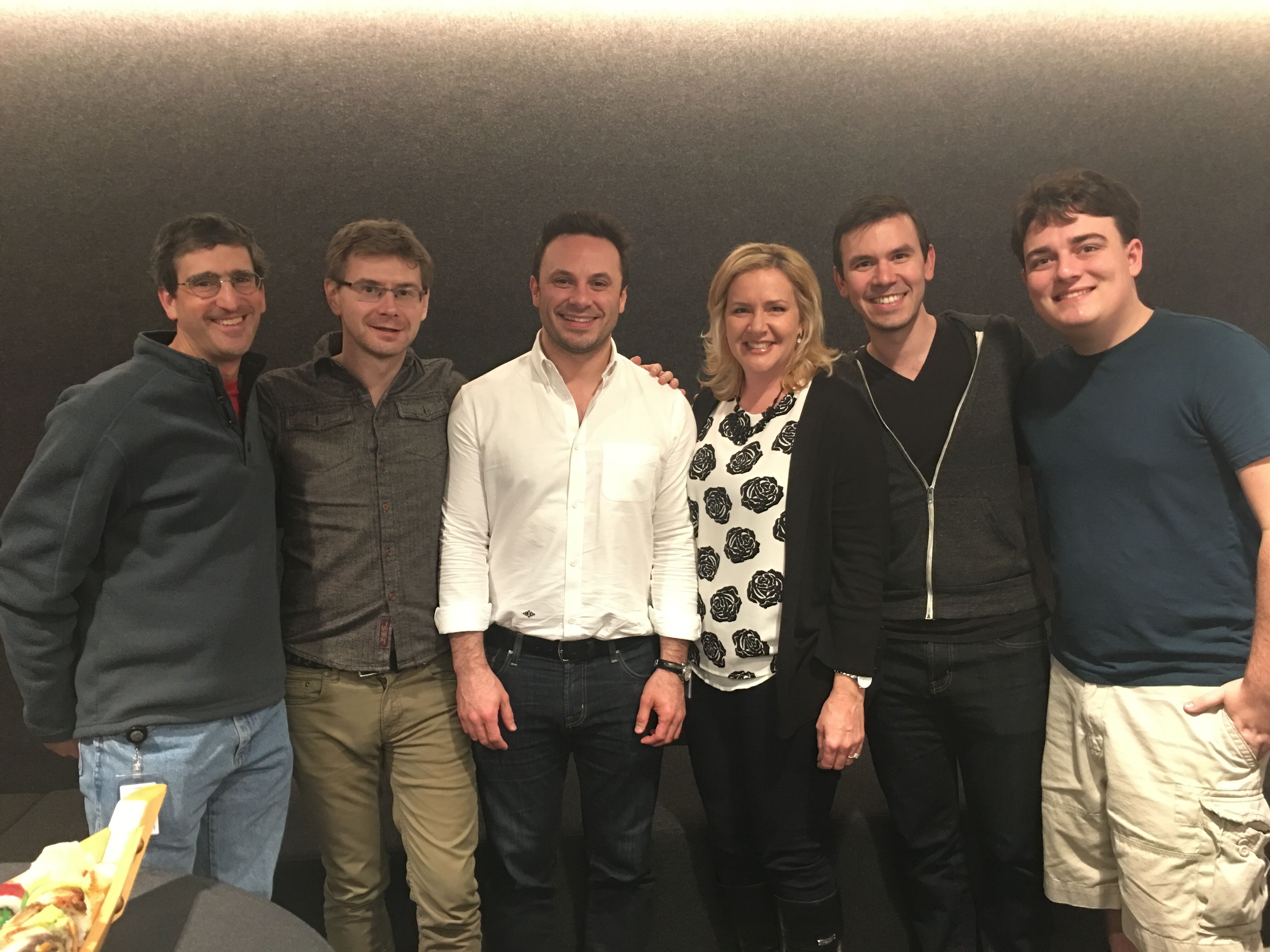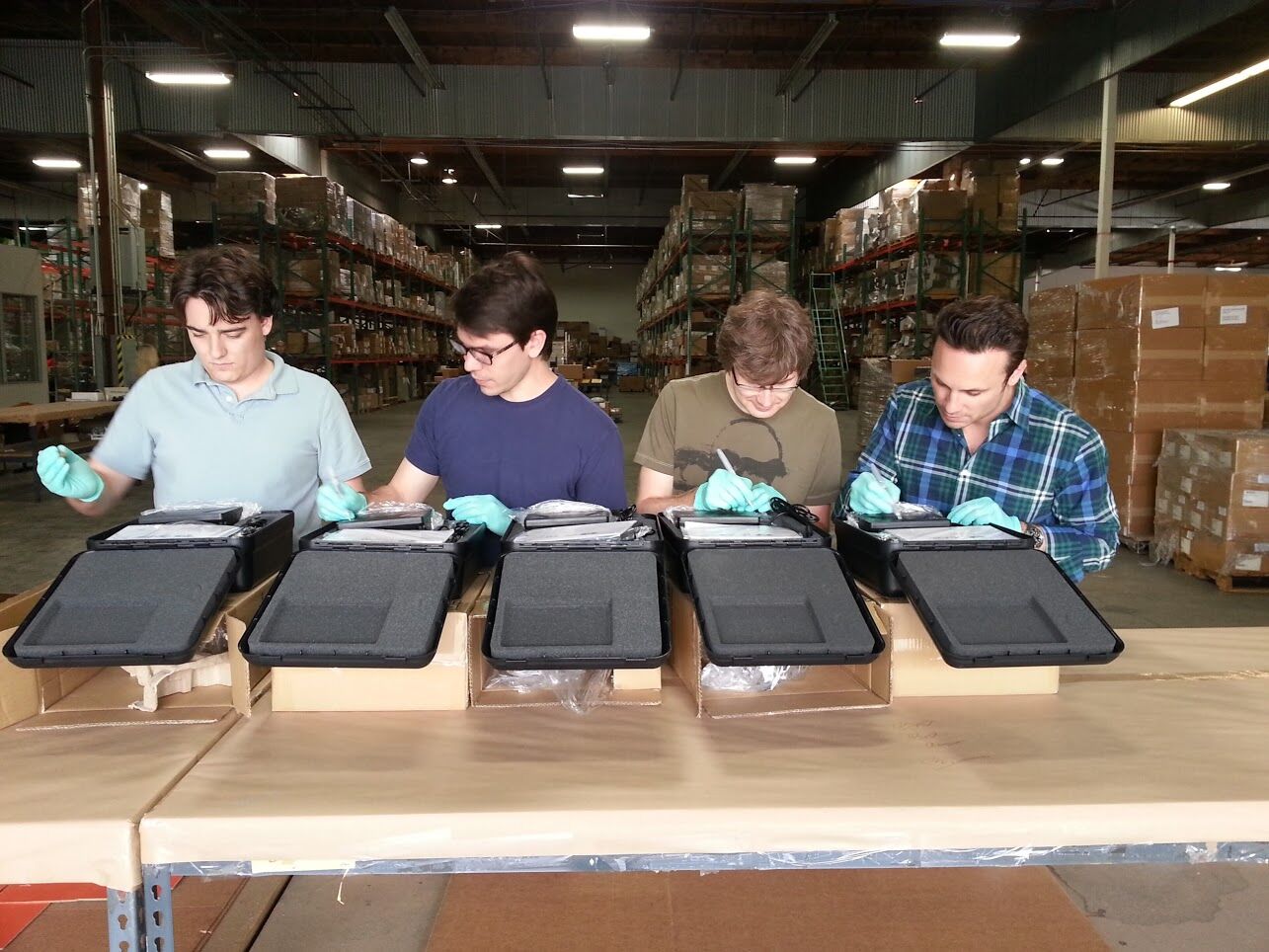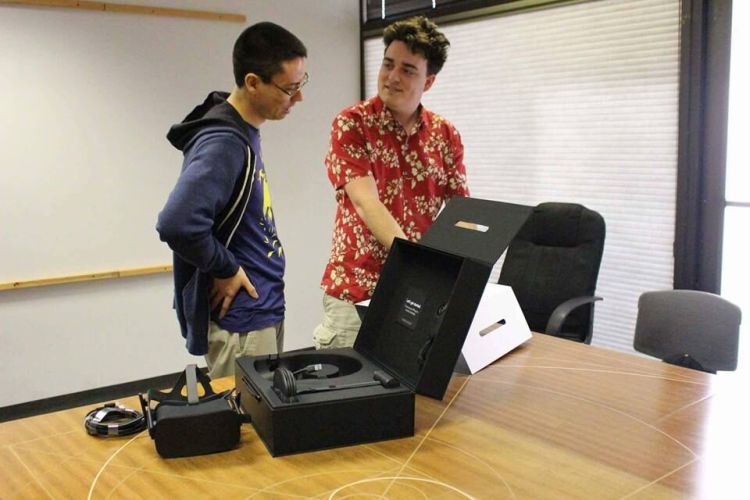
Above: Mark Zuckerberg, Facebook CEO, in the Oculus Rift virtual reality headset as Oculus VR CEO Brendan Iribe looks on.
GamesBeat: It sounded like you had to be careful in this particular part of the story.
Harris: Yeah. I would also say that it was kind of like–I don’t want to be too dramatic, but it was emotionally grueling for me, the whole process. I felt like, at the end of the day, Palmer had been very mistreated by his employer and by the media for being a Trump supporter. I felt like, in a sense, getting the truth, or at least the stuff I was uncovering, was going to absolve him. The idea of spending two years working to absolve a Trump supporter for his support of Trump–I don’t know if that was a mission I would have initially cared to set out for.
But at the end of the day, there are two things. I absolutely disagree with Palmer on a lot of political issues, and in particular around Trump. I feel like with Trump, someone could have the perspective of, his rhetoric doesn’t matter, and all that matters is his actions. Maybe it’s because I’m a writer and I deal with words for a living, but I absolutely disagree with that. At the same time, as much as I dislike Trump, I don’t find his supporters offensive purely because of their support of Trump. I find Trump offensive. But I can understand why he can be selected as a lesser of two evils, or why certain people could prioritize a Supreme Court seat or not going to war overseas.
The other thing that I found humbling, that gave me some optimism–after Facebook lied to me about what happened with Palmer–I should probably talk a bit about his exit, because I’ve since learned some things, and the different versions of the story are interesting. After I was told what I suspected might have been not true, or seemed a little puzzling, when they went as far as to say as it was Palmer’s choice to leave, I ended up bringing that to people that I trusted at Oculus and Facebook. People who I know are fellow liberals, as well as some Trump supporters there. I said, “Look, if you guys don’t help me tell a different story, this is all that I have. I can’t just write about my hunch that there’s a different version.”
It was really nice, to me, that people there on different ends of the political spectrum still felt Palmer was wronged. They were willing to stick their necks out to get me the details on what actually happened. I always thought this was more about principle than about a partisan position.
GamesBeat: In some ways it’s easy to start pointing fingers in this kind of situation. “Why didn’t Palmer behave in a different way? Why did he make that donation? Why did he continue to go to Trump rallies?” But that gets to–it’s beside the point. It’s not illegal for him to do that.
Harris: The legal issue is one thing. That’s pretty black and white. It’s not illegal for him to do it, and what happened to him was illegal. There’s also the ethical aspect, though, and that’s important. Especially because–I live in a liberal bubble too. But half of our country, 40 percent of our country, does feel differently. A lot of those people have valid reasons for feeling that way, as opposed to just anger or nationalism.
Going back to what I said about how this was a grueling experience for me, it really did force me to confront a lot of my own beliefs. I think I was personally intolerant of other views, or I assumed that liberal views were correct views. Spending a lot of time talking to Palmer, talking to the founder of Nimble America, and thinking about what I believe–if a colleague of mine believed in certain things, would I be okay with that?

Above: The early Oculus VR team
GamesBeat: You don’t want to be painted as the guy who’s defending someone who’s really not a nice person, a hateful person.
Harris: Right. That’s a big thing. Fortunately, because I had been in touch with Palmer at that point — I’d spoken to him every day for a year — I had a pretty good sense about who he was and what he believed. Now, two years after that, I feel even more confident that I have an accurate assessment of him. But I was very concerned that it was possible that Palmer donated to Nimble America and didn’t really know that much about what it was, and that the founders were hateful people, white supremacists. In my first calls with them, they were kind of snowing me, kind of making me hear what I wanted to hear.
But I did, over the course of–I think it was about a year and a half. I probably had about 10 hours of conversations with the Nimble America founder, a guy named Michael Maliovsky in the book. I genuinely believe that what he told me was true, and that seems to be backed up by his Reddit posts. I remember at one point, my heart sunk when I pulled up–I was able to get an archive page of his Reddit before he deleted it, and I saw he was a moderator for the Daily Stormer. I thought, “Oh my God, he’s a Nazi.” But then it turned out that was just him trolling Nazis. Okay, I’m not helping a very bad person here.
GamesBeat: That did make a difference to you? That you want to write about a person who isn’t hateful.
Harris: Yeah. Look, at the end of the day I was going to follow the facts where they led me. I would have done the same thing even if it turned out that it was a hateful group. I would have reported that. I would have felt bad about spending so much of my time investigating something that I didn’t believe deserve to exist.
One thing I found very saddening was that–in November, three months before the book’s publication, I shared some chapters with high-ranking folks at Oculus and Facebook who had declined to speak to me. At this point it was already too late for them to make changes, but out of respect I shared some of the chapters with them, including the chapters about Nimble America. Multiple people told me, “Wow, I didn’t know that.” These were the people who ended up deciding Palmer’s fate.
I found that staggering, that they had no idea what this thing even was. In fact, one of them had off-handedly mentioned to me that Palmer was involved in a “disinformation campaign.” That wasn’t what this was. I was shocked that they didn’t have any personal curiosity about this. I was personally curious about it — Palmer, what kind of stuff was he mixed up in? What kind of guy is he? And if not for the sake of my book, at least for the sake of them evaluating whether he should have a job there, you’d think they would triple-check that and make sure they knew exactly what he was involved in.

Above: Founders signing the first Oculus Rifts.
GamesBeat: It sounds like the internal investigation you mentioned there didn’t serve Facebook very well.
Harris: I have to say, I was shocked that the internal investigation didn’t turn up something. I figured that they would find something Palmer had done wrong, but I guess that speaks to how he acted professionally. We are all, as consumers of the media, sort of scarred by the depiction of Palmer. Even though it turned out to be largely untrue, I still think that our opinion of him changed a bit. I mention that to say that I think people now remember him or think about him as more of a rabble-rouser, kind of naughty, pushing the limits at work. But that didn’t happen. Since then he’s cosplayed in a bikini and definitely lived his life out loud a bit more, but he didn’t do those things while he was at Facebook. He was largely a model employee. He has his personality. He’s naive in certain ways. He’s excitable. But it wasn’t as if–
GamesBeat: He seems more like an independent thinker. Like a likable kid.
Harris: It’s kind of sad. When I was talking with [another writer], who’s doing a book on Facebook, he made an observation that I thought was very spot-on, that it was kind of sad–or I guess he didn’t say it was sad. But he made the observation that Facebook’s campus is One Hacker Way. Mark’s a hacker. He saw a lot of the young Mark in Palmer. The fact that Mark had no place for Palmer in his company shows that Mark wouldn’t have a place for a younger version of himself in his company. That shows a lot about how Facebook has changed.

